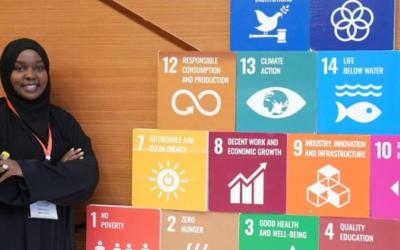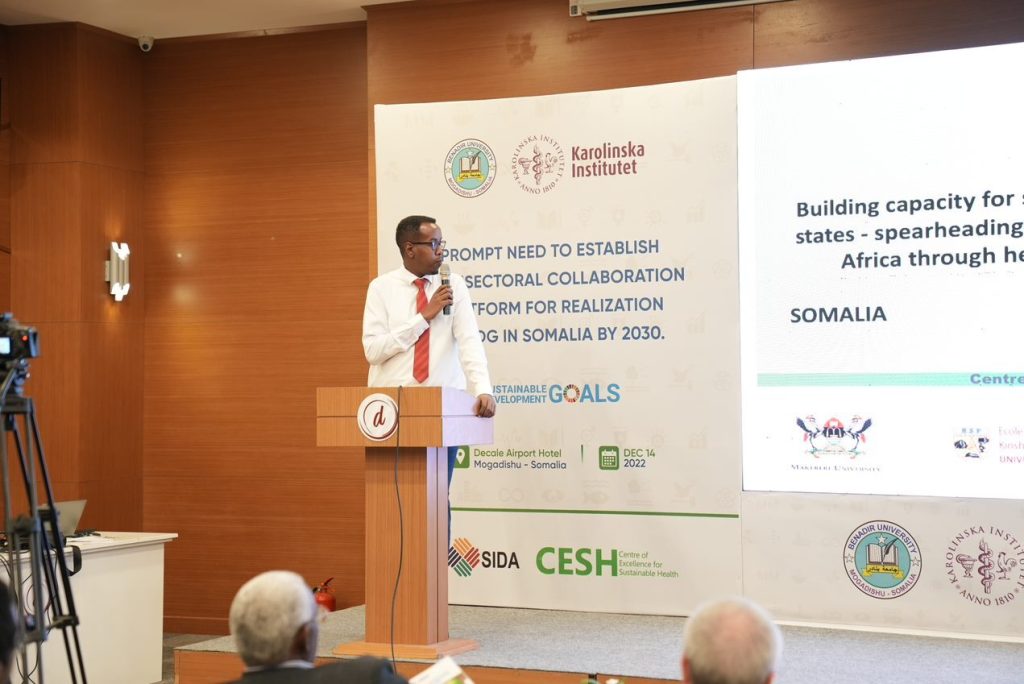Launching First Multisectoral Platform of Sustainable Development in Somalia

The Somalia team for the project Building capacity for sustainable development in fragile states (SDGCap) has launched a multisectoral platform for sustainable development. The event that took place mid-December featured a diverse group of fifty participants from the public and private sector, academia, civil society organization and representatives from donor agencies and ambassador’s, ministries and parliamentarians. The aim of the event was to discuss need for progress towards the SDGs and identify policies, strategies, and actions that would result in substantial changes and transitions to assure development towards the SDGs, boost momentum, and inspire global unity and multilateral cooperation.
One of the key activities of the SDG project is promoting the establishment of a multisectoral platform, the activity is linked to the outcome aim: cross-sectional cooperation, collaboration and knowledge sharing is strengthened across health and non-health stakeholders in Uganda, Somalia, and the Democratic Republic Congo towards realizing 2030 Agenda.
The program began with opening remarks by SDGCap Project Lead Team (PLT)coordinator Prof. Hassan Nor, who briefly discussed the project’s aims, collaborations, and activities. PLT member Rage Adem delivered a brief presentation about the project’s progress for the ending year, followed by a presentation on the Voluntary National Report by the Somali National Bureau of Statistics by Ahmed Qood.
During the event, the US Ambassador to Somalia, André Larry, stated that:
“Lunching multisectoral collaboration to achieve the SDGs by 2030 is an opportunity for Somalia and partners to come together to discuss the strategies and mechanisms for achieving the SDGs in Somalia, particularly in health and peace, justice, and strong institutions; individuals come and go, but institutions remain, and that is why we need to capacitate the institutions for success.”
The deputy minister of planning, investments, and economic development also made a brief speech on the event and clearly gave thanks to the collaborations with the four universities part of the project; Benadir University, Karolinska Institutet, Kinshasa School of Public Health and Makerere University School of Public Health on the achievements of the SDGs.
SDGCap program coordinator, Nina Viberg, also joined the event via videoconference as she delivered a speech, gave thanks for the participants, and talked about Sweden’s efforts in Somalia, particularly the SDGCap project, which strengthens Somali institutions and researchers on the achievement of the SDGs through partnerships and collaborations.

Rage Adem, Project Lead Team member of SDGCap and Director of Benadir University Innovation Centre. Photo: Shukri Elmi.
Key discussions
A member of the SDGcap team moderated a panel discussion on the results from a previous workshop of the interlinkages between the SDGs in Somalia. The discussion centered around the interlinkages between SDGs workshop particularly in SDG3 (good health and well-being) and SDG16 (peace, justice and strong institutions).
The panelists expressed their support for the findings and stressed the need of multisectoral cooperation in Somalia to meet the Sustainable Development Goals by the year 2030.
A member of the federal parliament and the rector of Benadir University delivered concluding comments, bringing the ceremony to an end. In his remarks, he discussed the partnerships between the Karolinska Institutet and Benadir University through the SDGCap, as well as the significance of the event by shedding light on the need for a national multisectoral coordination mechanism that is led by the ministry of planning via the national statistics office.
The rector thanked the donor project, the Swedish government, and the implementer Karolinska Institutet for their unwavering support in increasing the Somali institutions’ capacities.
